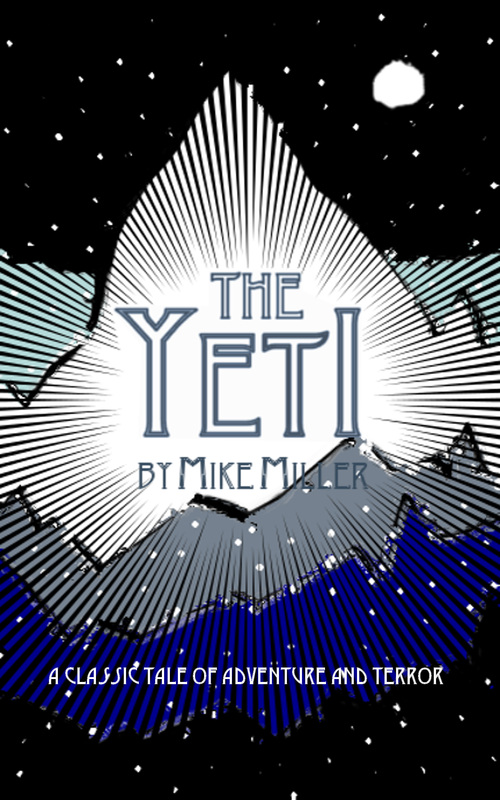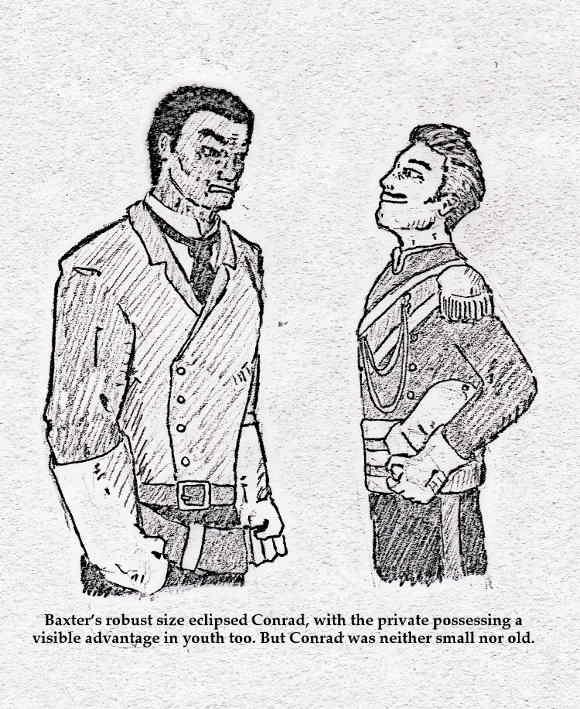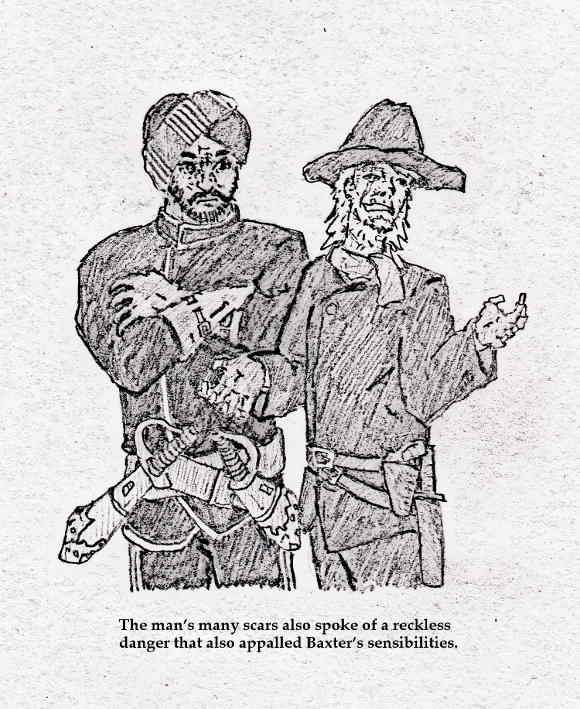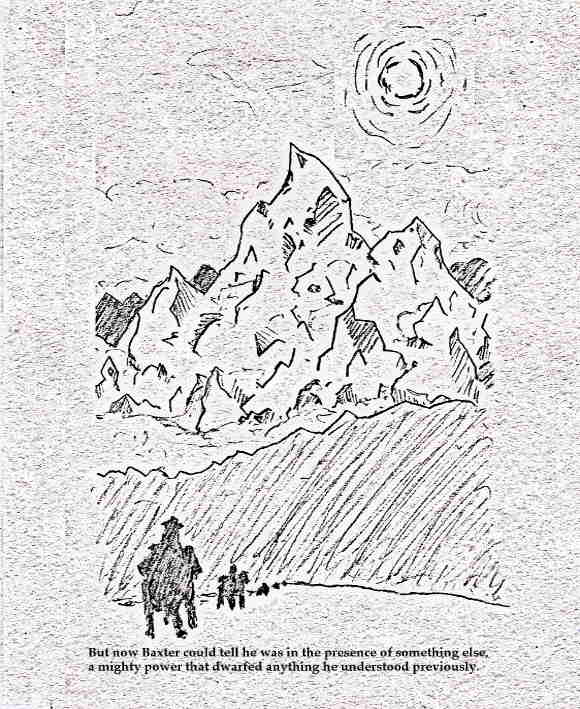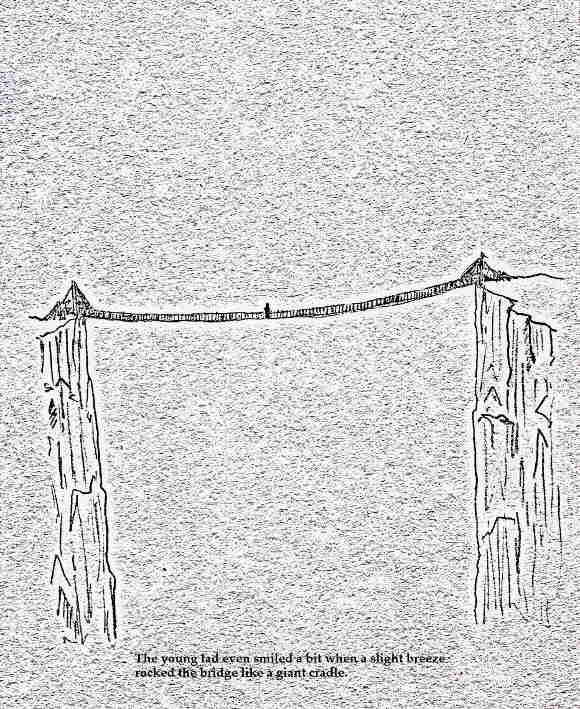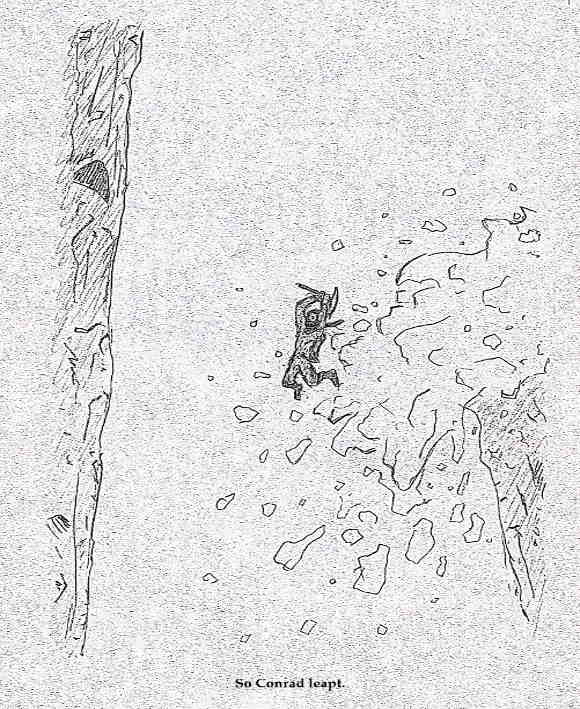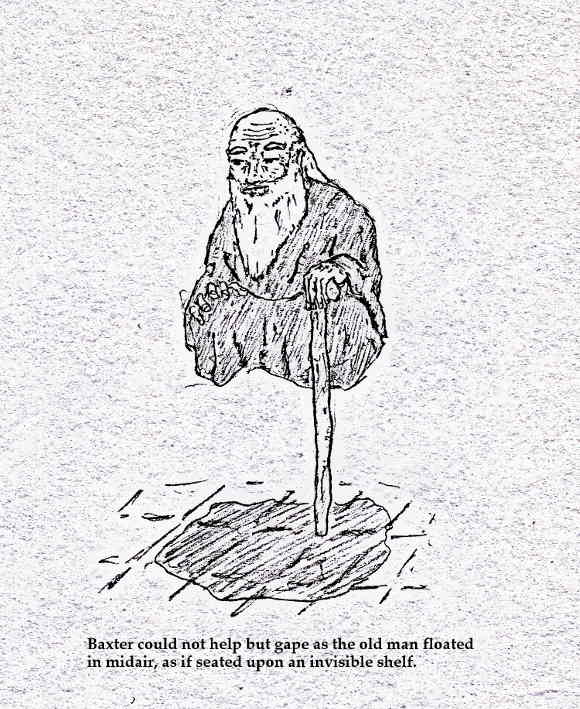|
The Yeti by Mike Miller - A Classic Tale of Adventure and Terror
Chapter I - The Old World
This world was white. There were no shades, shapes, nor colours here. There was simply the purity of absolute whiteness since everything else was obliterated from existence. In every direction the eye could see, this blank void extended to infinity. There was nothing but eternal emptiness, as if the space laid in wait to be filled and completed. This world was cold. The snow-blind blanket that obscured all vision was a fabric woven from a billion frozen particles of swirling ice. These molecules were too small and moved too fast to be seen, but they could be felt. Even the densest layers of clothing could not stop the chilling touch that owned this world. The cold could creep through the skin and into the heart like the skeletal fingers of a lonely wraith reaching to extinguish life. This world was loud. While there was a disturbing calmness to the absence of any visible forms, this raw universe compensated with an abundance of noise. The breaths of man and their occasional grunts of tired exertion were insignificant whimpers under the power of the wind. The rushing air smashed over rock and swirled the snow into a primal, elemental stew. This was the sound of a new world being birthed into an ugly, misshapen and uninhabitable place. The howling winds deafened like the roaring chorus of a legion of banshees at war. The furious winter sounds are the plaintive wails of a million souls being ripped down into the depths of hell. This world was pain. Eyes went blind, useless amidst the emptiness. Ears went deaf, succumbing to the overwhelming bombardment of noise. Skin became aflame from the punishing chill. The suffocating shroud of frost turned existence into agony. Every breath hurt, filling the lungs with a cold that attacked from the inside outward. This world suffered in a limbo between creation and destruction, and so it shared its torment with all those who entered it. Most of all, this world was death. Nothing was ever meant to live in this world, the frozen wasteland of the Himalayan Mountains. This place was at the highest limits of the earth, a unique part of the globe that travelled closest to the heavens. Perhaps this was God’s way of punishing those who attempted entry to His kingdom without the proper invitation. This world was a graveyard for all those who dared trespass upon it. Despite all obvious signs to avoid this cursed territory, a new group ignored the warnings to intrepidly adventure over this frozen terrain. A large train of men and mares soldiered together in sloppy single file through this wintry tempest. With every advancing step up the mountain slope, the unrelenting ground, the frozen elements, the almost non-existent air, all these forces of nature increased their power to collectively trample this convoy into submission. But still the group marched onwards. Pain was good, thought Captain Jonathan Fitzsimmons. It meant he had not frozen numb yet. At the head of this command and mounted atop the largest steed, Fitzsimmons used a thick mitt to wipe away the gathering snow from his goggles. Regaining the tiniest amount of visibility, he avoided the rocky wall face that suddenly emerged from his right as if by black magic. He effortlessly corrected his horse’s course to remain true to the route. To the path’s left, however, was a steep drop down a sheer cliff. It was of vital importance to lead the caravan along the straightest centre of the slippery ice-covered road. During this sortie, he had already lost one absent-minded man to gravity when his unsure footing toppled him to an unintentional death. Fitzsimmons dismissively laughed at the idea that the wall to his right had conspired with the cliff to the left to push that poor boy to his doom. The snow relented, and his eyes adjusted their focus. He could now see the vast abyss beyond and beneath his current station, a sprawling vista which stretched to the horizon before dissolving in grey vapours of mist and cloud. In the distant wilderness of the world beyond this mountain, the absolute domain of the whiteness withered to reveal tiny flecks of grey, black and brown, small bits of life on the less hostile peaks. The marvellous scenery made Fitzsimmons smile, as the loveliness of the view was the sole condition that actually improved as their altitude increased. Everything else only became worse. To warm himself, he recalled the brightest moment of his recent life: the event where he was chosen to embark on this journey. In a banquet hall back in the civilised world, General Harvey had proclaimed, “Fitzsimmons is our man.” So began his speech that addressed a select congregation of the kingdom’s elite bankers, politicians and military. Set off to the side of the stage but still prominently on display for these onlookers, Fitzsimmons remembered the intense pressure to please and perform before this group of Her Majesty’s most highly regarded decision-makers. But though he was the centre of discussion, he merely acted as an inanimate prop throughout the proceedings. Harvey played the auctioneer, the salesman busily lauding Fitzsimmons’ notable career to win him the choicest assignment yet. Stiff at attention, Fitzsimmons permitted only his eyes to live free, roaming over the galley of mighty authorities assembled around him. Their cold glances studied every thread of his outfit while their grumpy mouths whispered speculation and heresy about his character. Fitzsimmons couldn’t help but loathe all of them, since few of these wizened old gentlemen had ever risked their hides in the field of battle. Yet simultaneously as he hated these men, he prayed to win their approval and become one of them. “Having campaigned in honour of the crown throughout countless dark territories, from the jungles of India to the ice of Antarctica, Captain Fitzsimmons is the premier adventurer, soldier and leader, I daresay, in the entire realm. His intrepid experience for the unknown is exactly what we need for this crucial undertaking. I have no doubt he will transport the wares in time and intact.” Harvey spoke passionately as if delivering a preacher’s final sermon from the pulpit. With every breath, his believers grew. “There are few remaining shadows left on the map for the crown and sword of the empire to conquer. Already the nation of India has fallen firmly under our rule, and so now will Fitzsimmons’ envoy help to solidify our foothold on the rest of the Orient. While the Himalayas might be currently unknown to the British, I assure you all that it will soon hoist aloft the Union Jack. The powers of darkness threaten us from all sides, gentlemen, but we shall prevail.” After an interminable length of time nervously pacing the white marble hallway of Parliament, Fitzsimmons was finally approached by a humourless steward who promptly and joylessly congratulated the young captain upon being officially selected for the mission. Some would have said the captain was mad for lusting after such a hazardous assignment. But to this driven and ambitious officer, the expedition through the dreaded wild was the opportunity of a lifetime. It was a route that led to knighthood and all the corresponding glories. Thus he had been entrusted with a treasure of profound worth and a troop of men to take it through this treacherous world. The mountain became more dangerous with each step, and they were not yet halfway to their destination. But within a day, they would cross the summit, and soon return to a friendlier climate. In the midst of the howling wind, another howl was heard. It was a soft and distant sound, which quivered under a lower pitch than the thrashing melodies of the wild winds. The cry was low and guttural, an impassioned scream of anguish from some creature that was filled more with rage than sorrow. Though the noise was tiny to the ears of these men, to be heard at all in this tempest was a credit to its volume and power. “Halt,” Fitzsimmons commanded in a regal tone, though the men and beasts obeyed his command more by the sight of his uplifted glove than from his barely audible voice. But the strange caterwaul also helped to stop their trudge. Instead of scraping away the snow from his lenses, Fitzsimmons lowered the goggles for a better view. Knowing he had only moments before his vision became distorted from the cold, his eyes fought to adjust to the brightness of the hail attacking him. Slowly different shapes crystallised into view. There was the broken path up the mountain which vanished into the mist. A cavalcade of rocks lined their path, from puny pebbles to massive boulders that dwarfed the horses in size. Tiny snowflakes danced throughout Fitzsimmons’ vision, some in a soft, leisurely float while others hurried past in a fevered dash. He wanted to peer further into the distance for the source of the strange noise. But the freezing cold crept so quickly into his eyes that it forced him to vigorously blink some heat back into them, or else risk having them turn to stone. Suddenly a figure appeared running at him. It was a quickly lumbering silhouette that raced fearlessly at Fitzsimmons and his troop. His immediate reaction was to recline back in his seat at the shocking apparition. Yet a lifetime of militaristic discipline allowed his hand to quickly draw his pistol from its holster, despite the awkward glove on his hand and the fear in his blood. “Captain,” a familiar voice yelled, closely accompanied by a recognisable clatter of gear. It was Private MacDonald, one of the newer and therefore weaker scouts on the journey. MacDonald panted bursts of steam as he slowed his approach. Fitzsimmons cussed himself for being so skittish to nearly blast off the head of his own man. Hoping none of his troops witnessed his disastrous lapse in judgment or cowardly call to defence, he quietly holstered the weapon and composed himself to receive the scout. “Yes, private?” Fitzsimmons asked with definitive authority. “Sir, Gibbons has vanished, sir!” the young man exclaimed. The tiny eyes visible through the slit in his hood were wide with fright. “How so?” Fitzsimmons asked, looking past the scout and back up the trail. “The mountain just...” MacDonald’s voice trailed off. He fervently looked back over his shoulder. Fitzsimmons followed the gaze farther up the foggy, obscured path but saw only the usual desolation of the frozen mountainside. “Well?” Fitzsimmons asked irritably. MacDonald jumped at the barking demand. He turned back to his commander and cleared his throat in preparation to state the preposterous. “The mountain ate him, sir,” the young scout explained with absolute sincerity. His voice died with shame by the time it finished speaking the ridiculous statement. “What?” Fitzsimmons scoffed. “What in bloody hell does that mean? Has thin air made you daffy, lad?” Though Fitzsimmons sternly rebuked the soldier for the silliness, the hesitant glance the captain cast back at the trail did not reinforce the ridicule. “He was just, I don’t know, ten yards ahead of me?” the scout said. “And I was looking at him. Looking right at him, sir. And then he vanished. In a blink, he was gone. But I didn’t blink, captain.” The boy’s voice may have been crazed and excited, but it did not quiver with doubt. MacDonald’s hands spread to clutch the air like a pair of jaws. “I saw it just wrap around him.” Fitzsimmons noticed some of the others eavesdropping on the agitated scout’s report. On a trip such as this one, Fitzsimmons knew what great enemies fear and false alarm were. After years of adventuring, he had seen strange places do strange things to the mind, especially to the young and innocent ones. As a leader of men, he had to maintain order and sanity amongst the chaos and madness. “March!” he declared loudly to the rest of the men in a shout well-conditioned to be heard over loud winds, crashing waves and batteries of gunfire. The train of men, animals and cargo lurched back to life to resume their dreary trek. If they were to succeed, the caravan needed to keep moving before their muscles succumbed to the chill. This particular route through the mountain was supposedly the warmest and easiest one to make their deadline possible, but it was still violently harsh. “But, captain,” the scout pleaded earnestly. His commander’s fierce stare was enough to silence him before words can. “Look, MacDonald,” Fitzsimmons said calmly like a parent rebuking a child. “The explanation is so obvious I’m frankly a bit embarrassed to speak it.” The two allowed a couple of pack mules and officers to ride past. He leant over from his raised perch to place an affectionate hand on the boy’s shoulder and speak in a softer tone. “Gibbons has simply fallen off the trail. In this haze, the man lost his footing and tumbled over the side. And believe you me, boy, gravity will steal a man in a blink, just as you saw. Just as our mate Byron learned before on this blasted trip.” The captain patted the boy on the shoulder again though secretly wishing he had just slapped the foolish lad upside the head. Once finished with the paternal reassurance, he hoisted himself upright in the saddle and resumed the march forward. With the delay in his progression, the captain now found himself beside the large wooden chests that housed their consignment. With a happy smile, Fitzsimmons suddenly realised that he indeed cared more for these inanimate boxes then the simpleton he had just dismissed. While the captain advanced away from him, Private MacDonald remained to linger back in line. He mused upon his captain’s entirely credible theory on what he had witnessed, where his partner had simply lost his footing and fallen. But if the mountain’s gravity had indeed claimed his fellow scout, MacDonald wondered how to reconcile the unearthly roar that followed. Or the sharp scream that stopped as quickly as it had started, except that it ended with a sharp crack. MacDonald realised that he probably should’ve mentioned these details to the captain, especially considering his responsibility to the mission to faithfully report all observations. Back at the front of the procession, Fitzsimmons smiled proudly. Though the cold atmosphere at this level was worse than anything they had encountered previously on the expedition, he still felt good at having made it so far on now record time. Stifling that outbreak with MacDonald had also served to remind Fitzsimmons how his sterling understanding of the frail human psyche was yet another of his assets to safely guide this group. With every step forward towards the summit of the mountain, he was that much closer to his next promotion and the party’s descent. Soon it would be both literally and figuratively all downhill for Fitzsimmons. As if life could not become any sweeter to the captain, he now spotted up ahead a new figure trotting towards the group. A clearing in the falling snow had magically opened a portal to reveal the familiar shape of a man before obscuring him back behind the curtains of mist and fog. That young fool MacDonald had become such a yellow turncoat that he had abandoned Gibbons in the storm. The captain issued a friendly wave and a cheerful “Halloo!” to welcome his man’s successful return. The figure was dashing forward with an almost inhuman speed. “Gibbons?” The captain rubbed away his lenses, then covered his goggles to shield them from the flurry of snow. He squinted and peered ahead at the person rushing to meet him and began to realise this was not Gibbons. For some odd reason, this stranger almost had the loping gait of a bull, as if scuttling forward on all four limbs the way the head drastically bobbed. And before the captain could puzzle over the man’s immense size, he recoiled and gagged from the vile reek of rotting death that seemed to engulf him with a gust of wind. Fitzsimmons turned back towards the company of men behind him, hoping their stern faces and composure would reassure him back into sanity. Though their expressions were impossible to discern behind the hoods and scarves, Fitzsimmons could hear their murmurs of distress while the wood and metal of their rifles began rattling to attention. Even snow-blind and fresh with inexperience, they too could sense that something was wrong. Beneath all the sounds of frenzied preparation, a syncopated booming of racing feet rhythmically played like drums with increasing volume. The captain remained facing away from the visitor, frozen in place not by the cold but by dread, too afraid to learn the stranger’s identity. When the galloping abruptly ended, a piercing howl sounded immediately behind Fitzsimmons. The screech was accompanied by a rush of air cold enough to actually freeze the tiny hairs on the back of his neck beneath his winter wear. As the noise now tapered back to silence, the sound was almost peaceful to the captain, not entirely unlike the melancholy wail of some bagpipes playing at a funeral. Fitzsimmons now closed his eyes, content with the knowledge of a perfect truth amidst the chaotic gunfire and screaming which erupted about him: The stranger was not a man. END OF EXCERPT |
